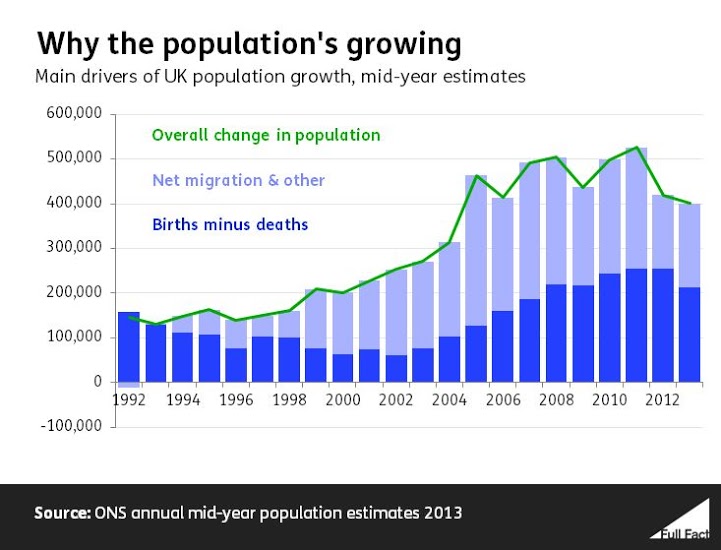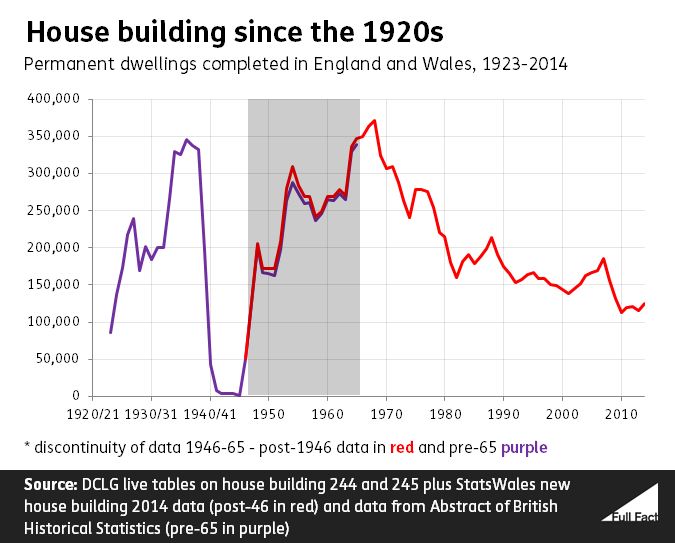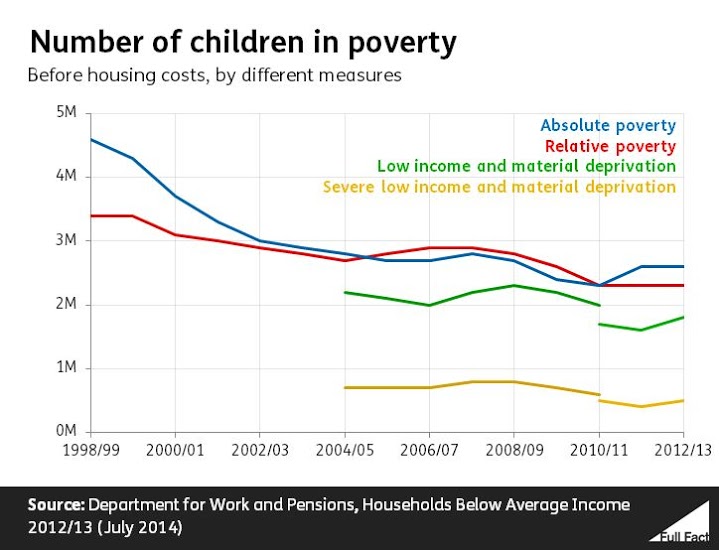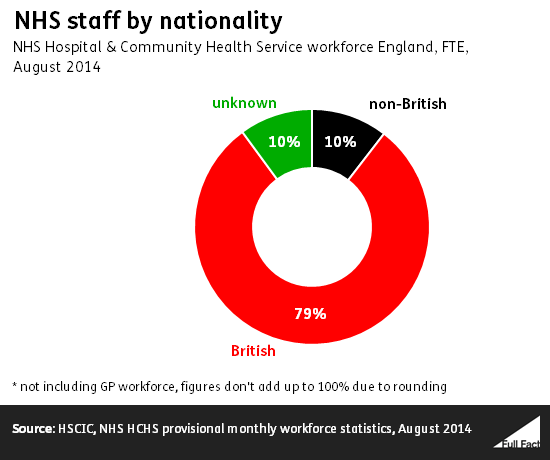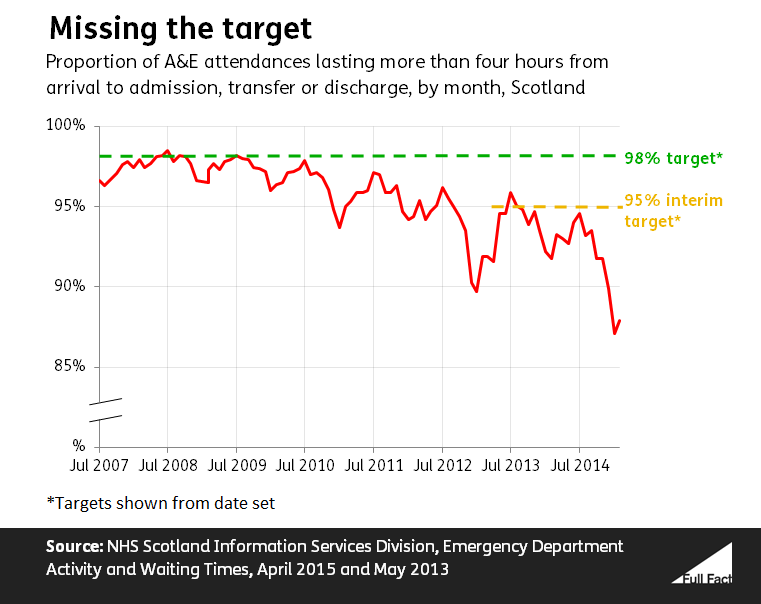9 claims from the challengers' debate, factchecked
Immigration and housing
"A rapidly rising population due to open-door immigration, started by Ed Miliband's Labour Party in the late 1990s, has directly contributed towards the housing crisis." - Nigel Farage
Immigration has directly contributed to most population growth over the last two decades. Net migration - the number of immigrants minus the number of emigrants - increased a lot in the late 1990s and after EU enlargement in 2004.
Immigrant households tend to be bigger than households of the overall population, so the number of homes they need is likely to be smaller.
The effect of immigrants on public finances
EU immigrants to our country do make a net contribution to our public finances" - Nicola Sturgeon
Research generally agrees that EU immigrants tend to contribute more than non-EU immigrants. And that immigrants who have arrived recently tend to contribute more than immigrants who've been living here longer-term. But that doesn't mean each individual actually contributes more than they receive from the state.
Join 72,953 people who trust us to check the facts
Sign up to get weekly updates on politics, immigration, health and more.
Subscribe to weekly email newsletters from Full Fact for updates on politics, immigration, health and more. Our fact checks are free to read but not to produce, so you will also get occasional emails about fundraising and other ways you can help. You can unsubscribe at any time. For more information about how we use your data see our Privacy Policy.
But putting numbers on this is hard, and there are a lot of alternative estimates.
Housebuilding
"In England, under this Government,we're building fewer homes than at any time since the 1920s, and that's got to change." — Ed Miliband
Is housebuilding at a historic low? Yes, but only if you exclude the years during the Second World War, when we were busy with other things.
However, the only data that can be compared this far back is for England and Wales.
It is also worth pointing out that relative to previous levels of house building over this period, the levels seen today are not that dissimilar to what they were in the final year of the last Labour government.
Empty government buildings
"By using empty government buildings, and there are plenty of them, [and by encouraging people to build on brownfield sites] we could produce 200,000 new affordable homes in this country every single year" - Nigel Farage
In 2014 there were 204,000 square metres of central government property vacant: that's 29 football pitches, or enough for 2,100 average-sized family homes.
That doesn't mean you could move in tomorrow, or bulldoze government buildings to create new sites for houses. A lot of government buildings are office space, and some of them the government only has the leasehold for.
The numbers here are just for central government, not local government, and don't include hospitals, schools or emergency services.
Children in poverty
"We have experts saying if we continue with austerity cuts by 2020 there will be 1 million more children across the UK living in poverty" - Nicola Sturgeon
Nicola Sturgeon is referring to the Institute for Fiscal Studies. It estimated in 2013 that there would be about 1.1 million more children in relative poverty in 2020/21 than there were in 2010/11.
Children living in relative poverty means that they live in households earning less than 60% of the median income in that year.
By an alternative measure (absolute poverty), the IFS estimated that there would be 1.4 million more children in poverty.
These figures come from before the 2013 budget, so things could have changed since then.
Debt and deficit
"It is important to get the deficit and the debt down" and "our national debt has doubled from £850 billion to £1.5 trillion" - Nicola Sturgeon and Nigel Farage
The deficit and the debt were mentioned by almost all leaders tonight. While the debt has gone up a lot, it's not right to say it has doubled since 2010.
The government's debt is about £1.5 trillion. This is up from about £960 billion in 2009-10.
The amount it increases by each year is the deficit. The deficit was about £90 billion last year.
Public finances are a bit like a swimming pool. The debt is the water in the pool (the result of past borrowing) and the deficit (the amount the government is borrowing) is the water flowing into it. Borrow more, and your swimming pool fills up faster.
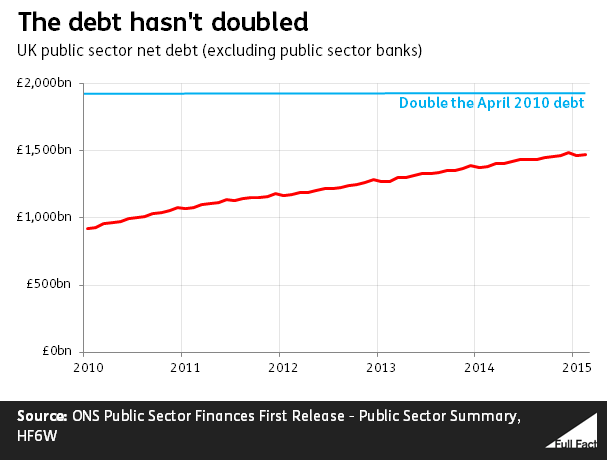
NHS staff
"1 in 4 doctors is foreign born, 40% of NHS staff are foreign born" - Natalie Bennett
A quarter of hospital doctors in England were foreign nationals in 2014. On top of that, 7% had no nationality recorded.
The number who were born abroad could be higher - plenty of British nationals were born overseas.
We haven't been able to find Bennett's 40% figure for all staff. By the hospital workforce statistics, 10% of hospital staff were foreign-nationals, and another 10% were of unknown nationality.
NHS targets
"The NHS is struggling in Scotland, because Nicola [Sturgeon] hasn't met her A&E targets for five and a half years" - Ed Miliband
In Scotland, the target is for 98% of A&E patients to wait less than 4 hours to be seen (from arrival to admission, discharge or transfer). This target was last met five and a half years ago in August 2009.
Not everyone agrees that 98% is the right target, though.
Doctors per head
"We've got fewer doctors per head of the population in Wales than in almost every country in the EU" - Leanne Wood
The UK has 2.8 doctors per 1,000 people according to the OECD. That means it only ranks ahead of Ireland (2.7), Slovenia (2.5) and Poland (2.2) among other EU countries listed.
The OECD doesn't publish figures for Wales on its own but Plaid Cymru says it has crunched the numbers and come out with 2.67.
